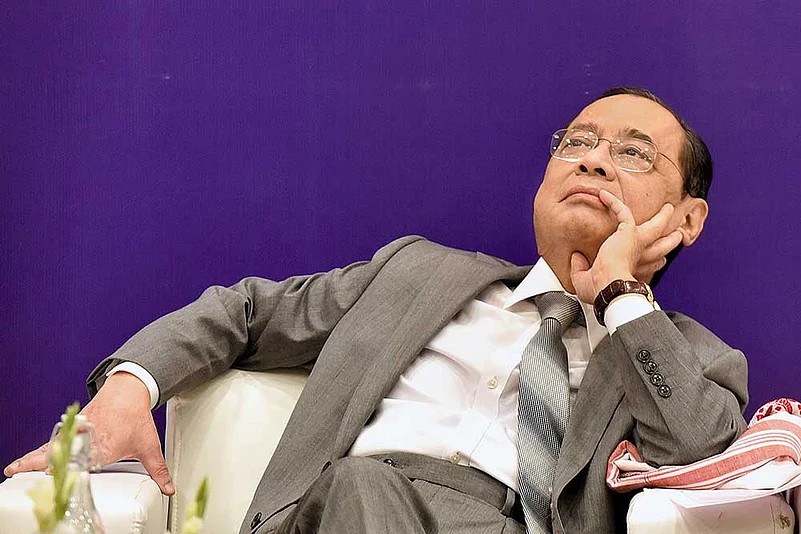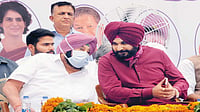On November 15, journalists covering the Supreme Court received an unusual note from the office of Ranjan Gogoi, the 46th Chief Justice of India, who was to demit office two days later. The note explained why the CJI could not grant journalists their request for one-to-one interviews. “Bitter truths must remain in memory,” the CJI said. Public memory, as the cliché goes, is short. However, it isn’t altogether absent. Gogoi’s ruse of keeping bitter truths about the Supreme Court—or are they more specific to his term as CJI?—confined to his memory seems ironic, if not altogether preposterous. The contradiction in such posturing is even starker given his participation in an unprecedented press conference in January 2018 when he, along with then SC judges, justices J. Chelameswar, Madan B. Lokur and Kurian Joseph, launched a scathing broadside against then CJI Dipak Misra.
On October 3 last year, when he was sworn in as the CJI, the cautious euphoria among those who had hailed him for his commitment towards constitutional morality and institutional integrity was expected. And, in the initial weeks, he did not disappoint. Within days of assuming office, Gogoi had shown a strong commitment for administrative reforms to help reduce the huge pendency of cases. But then began the tailspin. Hopes that the opaque decision-making process of the SC collegium—the five seniormost SC judges who recommend names for appointments and elevations of judges—would become more transparent under Gogoi quickly dissipated. The collegium’s recommendation to elevate justices Dinesh Maheshwari and Sanjeev Khanna to the SC after rescinding an earlier decision to elevate Rajasthan high court chief justice Pradeep Nandrajog and justice Rajendra Menon continued the trend of opacity in judicial appointments.
During Gogoi’s tenure the Centre agreed to increase the strength of judges in the SC to its highest ever tally of 34. However, the collegium’s inexplicable decisions on transferring Madras high court chief justice Vijaya Tahilramani to the Meghalaya high court instead of elevating her to the SC despite her seniority (she resigned in protest) or that of first nominating justice Akil Kureshi as chief justice of the Madhya Pradesh high court and, within days, transferring him to the Tripura high court expectedly raised a stink. No plausible explanation for these moves was given.
Former Delhi high court judge R.S. Sodhi, who had strongly criticised the judges’ press conference for lowering the prestige of the judiciary, believes Gogoi made no effort to correct a system that he had been critical of before becoming the CJI. “Gogoi’s image as the CJI is appalling and barring his verdict that brought the office of the chief justice under the RTI Act he has done nothing to raise the stature of the Supreme Court,” Sodhi says.
His failure in administrative tasks of making collegium decisions more transparent pales in front of the criticism that has come Gogoi’s way for his steering of judicial matters, including those that directly concerned him. In April, a former staffer, employed for a brief stint at the residence office of the CJI, alleged that she suffered persistent sexual harassment from Gogoi. On a day that the court was officially closed, Gogoi called for an urgent sitting and in a predictable pattern of anyone accused of a crime, discredited his accuser. Later, an in-house panel of three SC judges, led by his successor, S.A. Bobde, cleared the CJI of all charges after denying the accuser her right to counsel. The probe findings were never made public.
It is difficult to pick out the most egregious lapse in Gogoi’s stint as CJI because there are so many. If his last month in office was consumed by a fanatic zeal to resolve the Ayodhya dispute, the preceding months saw him directly steering the otherwise administrative process of the contentious National Register of Citizens (NRC) in Assam. The updated NRC left 19 lakh people staring at an uncertain future due to a process that was flawed to begin with. Gogoi publicly justified the NRC process and said that the number of people left stateless “doesn’t matter”.
Gogoi’s indifference to petitions challenging the government’s clampdown in Kashmir after abrogation of Article 370 showed his inability to uphold constitutionally-mandated fundamental rights. When CPM general secretary Sitaram Yechury filed a petition demanding an explanation from the Centre for forcefully detaining his party’s J&K legislator M.Y. Tarigami, CJI Gogoi “allowed” Yechury to travel to Srinagar, meet his comrade and then inform the court about the legislator’s condition. The instruction demolished the very purpose habeas corpus writs have in law. When Iltija Mufti moved a plea seeking permission to meet her mother and former J&K chief minister Mehbooba Mufti, who had been placed under house arrest, Gogoi mocked her, asking: “Why do you want to move around, it is very cold in Srinagar.” Such facetious remarks from the CJI were common throughout his tenure. When journalist Abhijit Iyer-Mitra moved a bail application following his arrest by Odisha Police in September 2018, Gogoi had remarked, “If you are facing threats, there is no safer place than jail.”
Lawyer and author Gautam Bhatia, in his assessment of Gogoi’s legacy, wrote that the ex-chief justice never gave any reasons for his instructions in habeas corpus petitions. “No reason for the extraordinary order that made fundamental rights subservient to the whims and fancies of the court without even an effort to locate them in the Constitution, no reason for anything. This was a court, and a chief justice, that had liberated itself from… the Constitution.”
The legacy that Gogoi leaves behind isn’t limited to his acts of commission as CJI but extends to actions he chose not to take. Take, for instance, his handling of petitions challenging the Centre’s controversial electoral bond scheme. After directing political parties before the Lok Sabha polls to furnish—in sealed covers—with the Election Commission details of funds received through such bonds, the CJI maintained a stony silence on the case for the remainder of his term. The Justice S.N. Dhingra-led panel set up to inquire into re-opening of cases linked to the 1984 anti-Sikh riots had submitted its report to the court—in sealed covers again—in June and asked for an early hearing for further directions, but the CJI never bothered. In June, the CJI-led bench was requested to hear a matter related to cases of lynching of Muslims, but Gogoi remarked that the issue “does not merit urgent hearing”.
In his last week as CJI, Gogoi undoubtedly gave some historic judgments—including the one that decreed the Ram Janmabhumi in Ayodhya to god Ram. However, the Sabarimala review petitions remained unresolved because the CJI-led Constitution bench, by a 3:2 majority verdict, referred the matter to a larger bench after citing similar disputes over faith, gender equality and rights, despite there being no such reference by the petitioners.
A little over a year ago, delivering the Ramnath Goenka Memorial Lecture, Gogoi had asserted that “independent journalists and sometimes noisy judges are needed to act as the democracy’s first line of defence”. His actions as CJI perhaps made him change his mind.


























